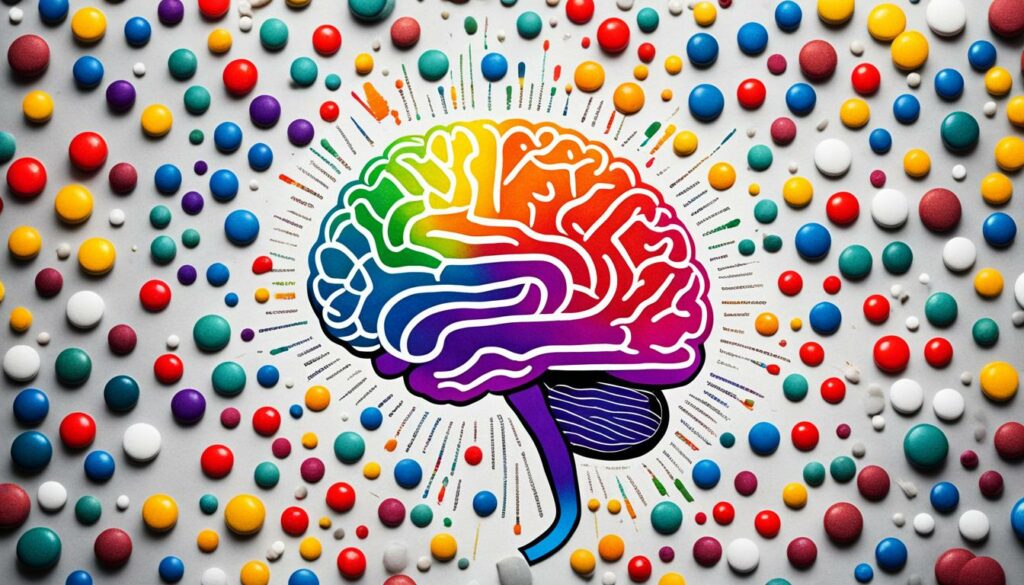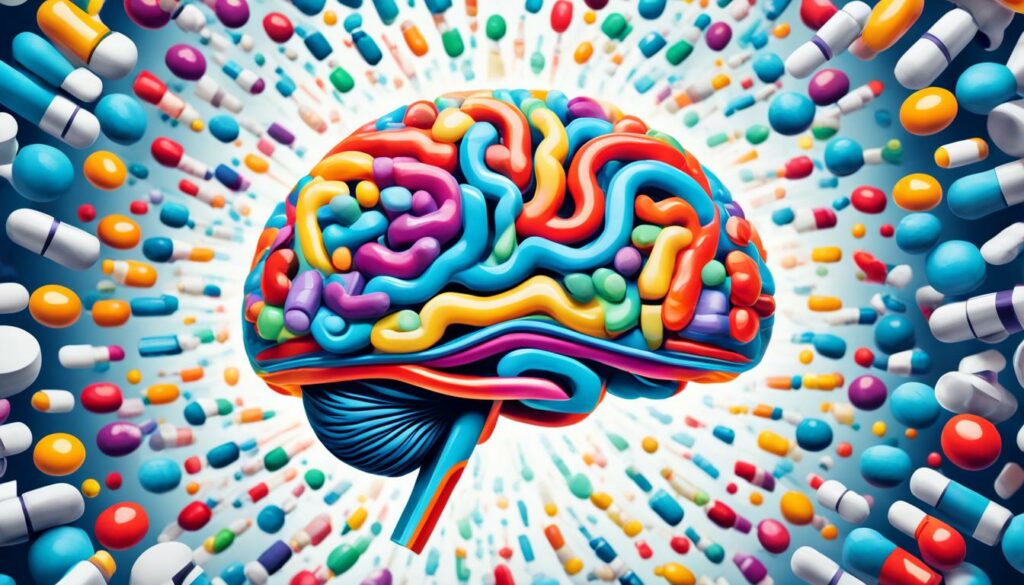Did you know that over 6.1 million children in the United States have been diagnosed with attention-deficit/hyperactivity disorder (ADHD)? That’s approximately 9.4% of all children aged 2-17. ADHD is a common neurodevelopmental disorder that affects a significant portion of the population, and many children and adults turn to medication to manage its symptoms.
While ADHD medication can be a helpful tool for symptom management, it also has a dark side that’s worth exploring. It’s crucial to understand the risks and realities associated with ADHD medication to make informed decisions about treatment options.
Key Takeaways:
- ADHD affects over 6.1 million children in the United States.
- ADHD medication can be beneficial for symptom management.
- It’s important to be aware of the potential risks and side effects of ADHD medication.
- Regular communication with a healthcare professional is essential for effective medication management.
- Individuals should weigh the risks and benefits of medication to make informed decisions about treatment.
Understanding ADHD and Its Symptoms
ADHD, or attention-deficit/hyperactivity disorder, is a common neurodevelopmental disorder that affects both children and adults. It is characterized by symptoms of inattention, impulsivity, and hyperactivity, which can vary in intensity and manifestation from person to person.
Symptoms in Children
In children, ADHD symptoms may manifest as:
- Inattention: difficulty staying focused, being easily distracted, and having trouble following instructions or completing tasks.
- Impulsivity: acting without thinking, interrupting others, and struggling with self-control.
- Hyperactivity: constant movement, restlessness, and difficulty staying still.
These symptoms can interfere with academic performance, social interactions, and day-to-day activities.
Symptoms in Adults
ADHD symptoms can persist into adulthood and may continue to impact daily life. In adults, ADHD symptoms may present as:
- Inattention: difficulty organizing tasks, poor time management, and frequent forgetfulness.
- Impulsivity: difficulty maintaining focus, interrupting conversations, and making impulsive decisions.
- Hyperactivity: feeling restless, difficulty sitting through long activities, and engaging in excessive risk-taking behavior.
These symptoms can affect work performance, relationships, and overall quality of life.
The Impact of ADHD Symptoms
Untreated ADHD can greatly impact an individual’s daily functioning. Children with ADHD may struggle academically, have difficulty making friends, and exhibit challenging behaviors. Adults with ADHD may face challenges in their careers, relationships, and overall well-being.
Understanding the symptoms can help individuals seek appropriate treatment options and strategies to manage ADHD effectively.
| ADHD Symptom | Impact |
|---|---|
| Inattention | Difficulty focusing, forgetting important tasks, and poor organization skills. |
| Impulsivity | Interrupting others, difficulty controlling impulses, and making hasty decisions. |
| Hyperactivity | Restlessness, constant need for movement, and difficulty staying still. |
Different Types of ADHD Medications
When it comes to treating ADHD, there are two main types of medications that are commonly used: stimulants and non-stimulants.
Stimulants:
Stimulant medications, such as Ritalin and Adderall, are the most commonly prescribed medications for ADHD. They work by increasing the levels of neurotransmitters like dopamine and norepinephrine in the brain. These neurotransmitters play a key role in improving focus and impulse control, helping individuals with ADHD manage their symptoms more effectively.
Non-stimulants:
Non-stimulant medications, like Strattera, are another option for treating ADHD. These medications work by increasing the levels of norepinephrine in the brain. Non-stimulants are typically prescribed when stimulant medications don’t work well or when there are side effects that make stimulants unsuitable. The choice between stimulants and non-stimulants depends on the individual’s response to the medication and their preferences.
It’s important to note that the effectiveness of ADHD medication can vary from person to person. Some individuals may respond better to stimulants, while others may find non-stimulants to be more beneficial. Working closely with a healthcare provider can help determine the right type of medication and dosage for optimal symptom management.
| Stimulants | Non-Stimulants |
|---|---|
| Ritalin | Strattera |
| Adderall | |

How ADHD Medications Work in the Brain
ADHD medications work by changing how the brain functions. These medications can be classified into two main types: stimulants and non-stimulants.
Stimulant medications, such as Ritalin and Adderall, increase the levels of neurotransmitters like dopamine and norepinephrine in the brain. These neurotransmitters play a crucial role in attention, motivation, and impulse control. By increasing their levels, stimulant medications help improve cognitive functions, including attention span, impulse control, and executive functions.
On the other hand, non-stimulant medications, like Strattera, primarily increase norepinephrine levels. This neurotransmitter is also involved in attention and regulating impulses. The increase in norepinephrine helps individuals with ADHD enhance their cognitive functions and improve their overall cognitive performance.
It’s important to note that these medications don’t cure ADHD. However, they can significantly help individuals with ADHD function more effectively in their daily lives.

Potential Side Effects and Challenges of ADHD Medication
While ADHD medications can greatly benefit individuals with attention-deficit/hyperactivity disorder, it’s important to be aware of the potential side effects that may arise from their use. Common side effects include insomnia, rapid heartbeat, dry mouth, and reduced appetite.
Insomnia can be a challenging side effect, as it can interfere with sleep patterns and lead to daytime fatigue and difficulty concentrating. Rapid heartbeat, another possible side effect, may cause feelings of restlessness and increased anxiety.
Dry mouth is another common side effect that individuals may experience while taking ADHD medication. This can be alleviated by drinking plenty of water and using sugar-free candies or gum. Reduced appetite is also a potential side effect, which can lead to weight loss in some cases.
Additionally, some individuals may experience a rebound effect when the medication wears off. This can manifest as headaches, confusion, hypersensitivity to light and sound, and difficulty concentrating.
It’s crucial to communicate any side effects experienced while taking ADHD medication to a healthcare professional. They can assess the situation and make adjustments to the medication or dosage accordingly. Open and honest communication with the doctor is key in managing these side effects and finding the most suitable treatment plan.
Expert Tip:
“If you or your child experience any side effects from ADHD medication, don’t hesitate to reach out to your healthcare provider. They are there to support you and can provide guidance on how to manage these challenges effectively.”
Managing side effects can be challenging, as it may require some trial and error to find the right medication and dosage that provides symptom relief while minimizing adverse effects. It’s important to remember that every individual’s response to medication is unique, and finding the right balance is essential for optimal treatment outcomes.

Comparing Potential Side Effects of Stimulant and Non-Stimulant ADHD Medications
| Side Effects | Stimulant Medications | Non-Stimulant Medications |
|---|---|---|
| Insomnia | Common | Rare |
| Rapid Heartbeat | Common | Rare |
| Dry Mouth | Common | Common |
| Reduced Appetite | Common | Rare |
Conclusion
When it comes to managing ADHD symptoms, medication can be a valuable tool. However, it’s crucial to carefully weigh the risks and benefits before starting any treatment. While common side effects like appetite loss or headaches can often be successfully managed with adjustments in medication or dosage, it’s important to remain vigilant for rare side effects such as tics, hallucinations, or heart problems, which may require switching to a different medication.
Working closely with a knowledgeable doctor is essential in finding the right ADHD medication and dosage that offers symptom relief while minimizing side effects. Open communication and regular monitoring should be maintained throughout the treatment process to ensure the medication is effectively managing symptoms and providing the necessary support for individuals with ADHD.
ADHD medication management is a delicate balance, and each person’s experience with medication can vary. It’s important to remember that what works for one individual may not work for another. By collaborating with a healthcare professional and actively participating in the management of ADHD medication, individuals can improve their quality of life and optimize their ability to focus, concentrate, and manage impulsivity.
In conclusion, ADHD medication can be an effective component of a comprehensive treatment plan, but it’s crucial to prioritize the careful assessment of risks and benefits. By finding the right medication and working closely with a healthcare professional, individuals with ADHD can manage their symptoms and thrive in various aspects of life.
